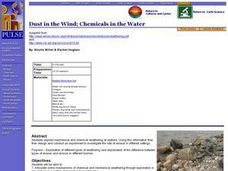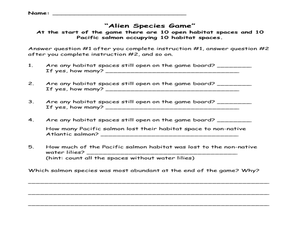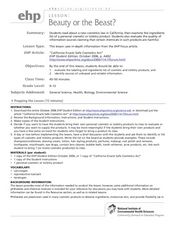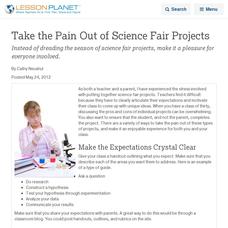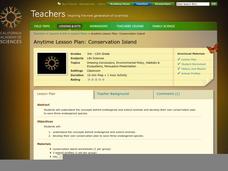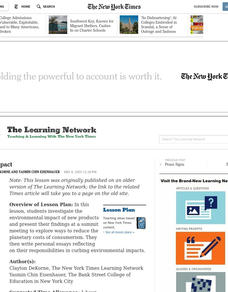Curated OER
Science and Government: Unholy Alliance or Millennial Bliss?
Pupils participate in a class discussion about scientific developments since 1945. They discuss the risks to the world that stem from these developments and whose responsibility it is to determine the future direction of scientific...
Curated OER
Reading and Thinking About Evolution
Students are given a science reading assignment outside the text followed by a discussion on the content. The reading is augmented with a series of thought questions for students to consider prior to class discussion. They direst the...
Curated OER
Why Does Evolution Matter Now?
Students are shown why they should care about evolution. They become specialists in one sphere influenced by evolution and then share their findings with their group. Students are lead into a class discussion, so that each student can...
Curated OER
Viruses and Host Evolution
Students are organized into groups of four. On Day 1 they are given a worksheet about viruses and their effects on the evolution of a rabbit population. After about 30 minutes of group work, a class discussion of the material begins. ...
Curated OER
Dust in the Wind; Chemicals in the Water
Students explore mechanical and chemical weathering at stations. They articulate some mechanisms of chemical and mechanical weathering through exploration in a lab. Students stations describe how chemical weathering differs from...
Curated OER
Predator Or Prey?
Students study the concept of predator/prey by researching specific examples of birds. They participate in a concept map/webbing activity to determine different characteristics of birds. They engage in a class discussion about...
Curated OER
Stopping Global Climate Change
Students synthesize or express concepts towards solving the question posed at each lab station about climate change. After all lab teams have finished, the teacher facilitates a class discussion on teams' responses to each station.
Curated OER
From Ada to Grace to Sandy - Women Have IT
Explore the significant contributions women have made in the field of information technology with an instructive lesson plan. Through class discussion and research, learners discover how women have aided in the growth of the field of...
Curated OER
The Human Organism
For this digestion and nutrition lesson, 3rd graders test foods to find their vitamin content. Students test for starch and fats then compare their findings on charts and oral reports. The lesson concludes with a teacher directed class...
Curated OER
Salmon and the Non-Native Species
Students investigate the affect of non-native species on Pacific Salmon. In this non-native species and Pacific Salmon lesson, students participate in a competition and habitat loss game. They play the game in groups, while answering...
NSW Department of Education
Relationships Between Formal Measurement Units: Measure and Record Mass in Kilograms and Grams
Teach the masses about the metric system with this hands-on measurement lesson. Given a fruit or vegetable, learners estimate, measure, and convert its mass using the metric units gram and kilogram.
Tracy Pendry
Cardiovascular/Circulatory System
Explore the circulatory system with a cardiovascular pump activity that promotes discovery and discussion as class members create a functioning model of the heart. Continue the learning process through a web quest showcasing the body's...
Blogger
Door and Key Poster
This multi-colored printable simply states that math is the door and the key for scientific study. It might be useful at the beginning of the science school year to display the quote by Roger Bacon and discuss how math can be both door...
NorthEast Ohio Geoscience Education Outreach
Earth, Sun and You
Middle schoolers model Earth's revolution round the sun by walking a mini-globe around a lamp. You will assess whether or not they tilt and rotate the planet properly and that the revolution is counterclockwise. Discussion beforehand...
Curated OER
Discussion of Adaptation
Students discuss ways in which dinosaurs adapted to their environments. They apply the same logic to an analysis of human habitat, survival needs, and survival need fulfillment to explain how people have adapted to their environment.
Curated OER
Beauty or the Beast
Does the FDA really intend to protect public health? Spark a debate in your chemistry or health class by using this article, titled "Beauty or the Beast." It questions the safety of cosmetics and toiletry products, govenment regulations,...
Curated OER
Take the Pain Out of Science Fair Projects
Instead of dreading the season of science fair projects, make it a pleasure for everyone involved.
Computer Science Unplugged
Twenty Guesses—Information Theory
How do we determine how much information to include and what can be left out? By playing a game of 20 questions, the class generates the best strategies for finding a number. They then move on to guessing the next letter in a short...
National Institute of Open Schooling
Aldehydes, Ketones and Carboxylic Acids
Although their name makes them sound dangerous or toxic, carboxylic acids are found throughout nature in things such as citric acid, vinegar, and even in your DNA. Through detailed readings, discussions, and answering questions...
Curated OER
Thermal Expansion and Sea Level Rise
Placing a thermometer and a glass tube into a flask of cold water and sealing it, you can expose it to heat and very visually demonstrate thermal expansion to your earth science class. Follow it with a discussion about how the increasing...
California Academy of Science
Conservation Island
Why not walk in the footsteps of Teddy Roosevelt and become a conservationist? After discussing issues and reasons for animal extinction, the class creates their own conservation plans. Each small group is given mock data regarding a...
Code.org
Good and Bad Data Visualizations
Good versus bad data. Pairs rate online collections of data representations from good to bad and then suggest ways to improve the visualizations. The class then creates a list of best practices and common errors in data representations...
Curated OER
Deep Impact
How can acknowledging opposing viewpoints reinforce one's argument? Use this New York Times lesson to study consumerism and the environmental impact of new products. After reading the article "Whether a Hummer or a Hybrid, the Big...
Curated OER
Changing Planet: Fading Corals
Show the six-minute video, "Changing Planet: Fading Corals," and then demonstrate how calcium carbonate forms a precipitate in the presence of carbon dioxide. Separate your scientists into small groups to gather information about coral...






